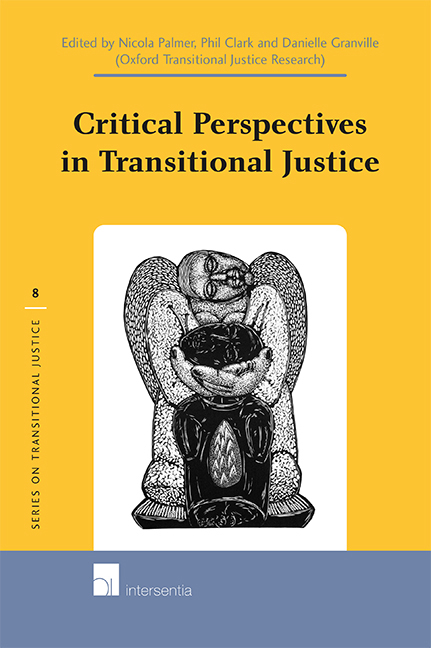Book contents
- Frontmatter
- Note
- Acknowledgements
- Contents
- Abbreviations
- Introduction
- Section 1 Critiquing Core Concepts in Transitional Justice
- Section 2 Accountability, Human Rights and the Rule of Law
- Section 3 Locality and Legitimacy
- Section 4 Memory, Ritual and Apology
- Section 5 Transitional Justice After Transition
- Contributors’ Biographies
- Series on Transitional Justice
5 - Commentary on Critiquing Core Transitional Justice Concepts
Published online by Cambridge University Press: 22 December 2020
- Frontmatter
- Note
- Acknowledgements
- Contents
- Abbreviations
- Introduction
- Section 1 Critiquing Core Concepts in Transitional Justice
- Section 2 Accountability, Human Rights and the Rule of Law
- Section 3 Locality and Legitimacy
- Section 4 Memory, Ritual and Apology
- Section 5 Transitional Justice After Transition
- Contributors’ Biographies
- Series on Transitional Justice
Summary
Theorists, whether legal, political or moral, have a peculiar role in the burgeoning academic field of transitional justice. It is not entirely clear if they are needed. The field has such a powerfully practical orientation, and its subject is so varied and dynamic, that we theorists can often seem to be running after it, waving our arms and imploring it to slow down so that we can have a decent look at just what transitional justice is and how the field and its basic concepts and problems arose; whether these basic concepts and problems (‘transition,’ for instance, or ‘justice’) are coherent and consistent; whether any methodological constants ought to guide comparative studies of vastly different post-conflict contexts; and whether the field does or does not compel a normative dimension to theory.
Genealogy, basic conceptual analysis, methodology and normativity are certainly four crucial areas for any field of study, and it is not unreasonable that theorists can and in fact must have something to contribute in each category. The four chapters in this section aptly demonstrate this catalogue of theoretical aims and ambitions, for each of them, in its way, develops a distinct claim about what theorists ought to be doing to pull their weight in the developing field of transitional justice studies.
The chapters by Larry May and Shaina P. Wang can be grouped together insofar as they both lay special emphasis on the genealogical and the normative.
May's chapter traces some of the basic concepts of contemporary transitional justice to the early-modern development of international law, and finds in the law of war some conceptual resources for what is arguably the central problem of transitional justice: the three-way conflict among the distinct, frequently incompatible goals of criminal retribution, reparation and restitution of victims, and the achievement of adequate post-bellum levels of peace and security.
In Grotius and Vattel, May identifies two central pragmatic principles of jus post belllum. According to the first, victors ought to so direct all post-conflict arrangements such that, at a minimum, nothing they do will guarantee the resumption of conflict; maximally, post-conflict arrangements ought to contribute to the conditions for a durable peace and security.
- Type
- Chapter
- Information
- Critical Perspectives in Transitional Justice , pp. 91 - 100Publisher: IntersentiaPrint publication year: 2012

